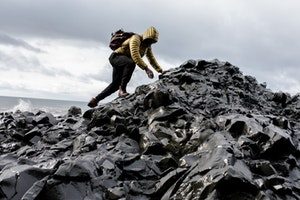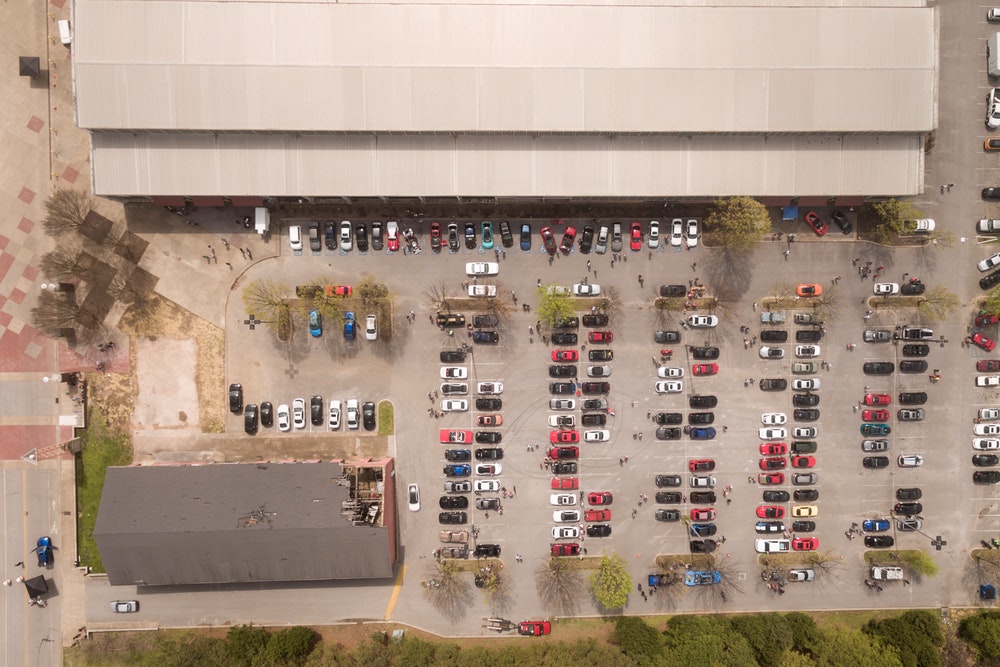When God Provides, It’s Not Always an Easy Ride
 I work for one of the school districts in my city and my office is in one of the high schools. Depending on the day, close parking is scarce, you know, with both staff and students needing to park.
I work for one of the school districts in my city and my office is in one of the high schools. Depending on the day, close parking is scarce, you know, with both staff and students needing to park.
Typically, by the time I go into work, all the building row spots (the row right near the entrance I use) are already taken by staff so I have to park in the lot. Now, again, staff and students are parking so many days, I park at the back of the lot furthest from the school. The only day I am seemingly guaranteed a building row spot is when it rains.
See, when it rains, the first spot in the row after the handicap spots kinda slants causing a puddle to form. Now, this puddle is just deep enough to submerge your entire foot in water up to your ankle. This, I am sure, is the reason that nobody ever parks there when it rains.
Not only is the puddle that deep, but it extends pretty far into the middle of the spot, so you can’t really plan to bypass it.
In order to successfully park in this first spot (yes, there’s a technique), one must get just close enough to the curb to step over the water. This will take a couple of tries since the water is so deep that you can’t even just put the tip of your foot in for leverage. I know it sounds easy enough as you are reading this to yourself, but it’s a bit tricky.
Once you get close enough, you must step onto the curb and walk into the grass. From the grass, you’ve got to hop over the small puddle that’s on the sidewalk. Okay, that may sound tedious, but once properly weighing that option against that of parking at the back of the lot across the way, I’m sure you’ll agree that it’s worth it. And, if you don’t, it’s fine – I’ll still be parking in that first building row spot on every rainy day.
But, Does it Take All of That, Lord?
 Alright, here we go. Yes, I know you don’t care where I park at work. You probably don’t even care that I go to work at all but you’re here again, wondering how this ties into actual Christian life situations. Don’t worry… I got you.
Alright, here we go. Yes, I know you don’t care where I park at work. You probably don’t even care that I go to work at all but you’re here again, wondering how this ties into actual Christian life situations. Don’t worry… I got you.
Mmmkay, that building row represents where you want to be in life, right up close to your blessings, your promises, your dreams – the ones that you have your sights set on from God.
That parking lot represents where you’ve been waiting because you are afraid to get your feet wet.
What I need you to understand is that promises do not come without a process. There will always be opposition, like the rain, that causes this massive puddle to form. Just when you think you’ve got the front row spot, you realize it takes extra work to get it.
The thing is, you must be willing to do what others are not willing to do and park close enough to climb over it, walk through the grass, and hop onto that sidewalk. It’s going to take work, but as the saying goes, “Anything worth having is worth working for”. Just like at that school, many are not willing to work that hard for a parking spot, no matter how close it is to the door.
But you know what? That just means that there’s more room for you!
And, you will notice that where you are truly meant to go, there probably won’t be too many people there. When you remember my little analogy, you’ll understand why. They didn’t want to climb, step, or hop. You know what else? God wants you to get there. Yeah, He does. If He didn’t, there wouldn’t be provision made for you to do so.
So, What’s the Play Call?
I need you to realize, in this moment, that provision isn’t always easy. Provision doesn’t mean simple, it just means there is a way. My fail-proof parking method isn’t the simplest of choices, but it guarantees my spot. Here are a few things to keep in mind before you decide to give in and just take that “lot spot” in the back:
- Let God take control. Sometimes, we talk ourselves out of that “first spot” because it seems too difficult to master. If you just surrender your will to His, you’ll get there. “Commit your actions to the Lord, and your plans will succeed.” Proverbs 16:3 (NLT)
- Don’t doubt. I know, for a fact, that I’ve missed some things. Not because things weren’t possible for me to achieve, but because I didn’t believe that I could. Don’t be like I was. “Jesus said unto him, If thou canst believe all things are possible to him that beileveth.” Mark 9:23
- Your faith requires movement. Yep, we can believe all we want that we’ll “get there”, but God wants us to move as well. You’ve gotta be willing to park in the puddle to get over it. “For as the body without the spirit is dead, so faith without works is dead also.” James 2:26
- Talk your fears out with God. Yes, fear is real and just because we serve God, it does not mean we are exempt from feeling it. It does mean that we have the key to deliverance from it. “I sought the Lord, and he heard me, and delivered me from all my fears.” Psalms 34:4
It may be “raining” right now, but use that to your advantage. Park closer and climb over that puddle. Trust God and take that building row spot He provided just for you.




